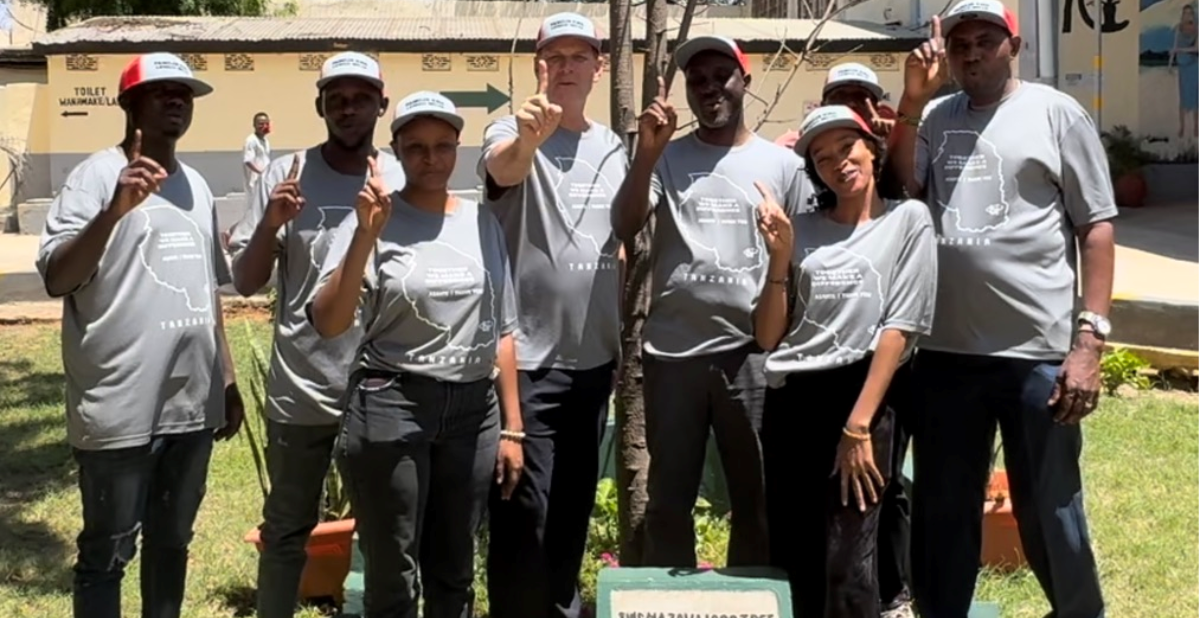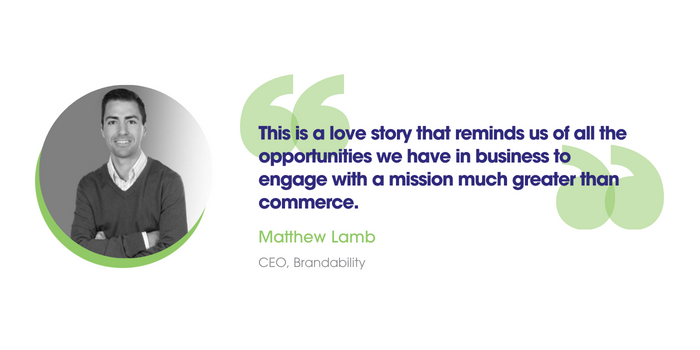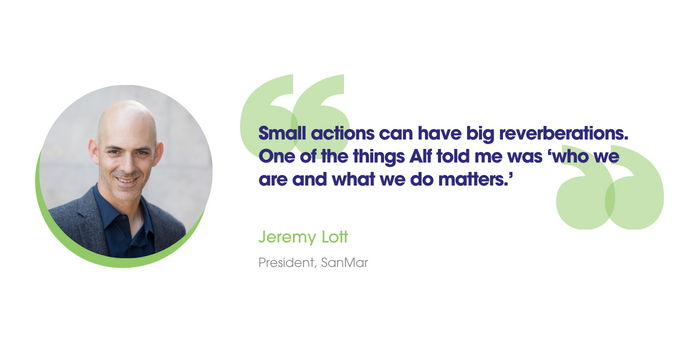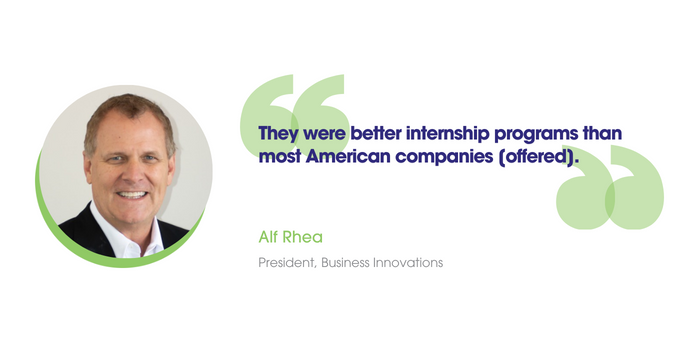‘Don’t Go It Alone’: Distributors, Supplier Create Internships In Tanzania

Alf Rhea has been in the promotional products industry for 28 years, and there’s always been a tenuous balance involved in the distributor/supplier dynamic. Some might call it a love/hate relationship.
“They need us, we need them, and there can be all this insecurity talking,” says Rhea, president of Business Innovations, which was recently purchased by Brandability.
But when he wanted to help people in Tanzania who desperately needed opportunities in order to improve their circumstances, Rhea found that the natural give-and-pull that comes with business washed away.
- Business Innovations, now Brandability, teamed with SanMar – PPAI 100’s No. 1 ranked supplier – to create an internship program associated with the supplier’s factory in the region.
- More distributors, including Hitex Marketing, Macco Promotions, Madden Branded Goods and Brandability before its acquisition of Business Innovations, all contributed by sponsoring interns in the program.
“This is a great example of distributors and suppliers that worked together for a common good,” Rhea says.
Each party had something to offer, and the recipients of this goodwill had something to prove. As a result, the entire program came to fruition shockingly fast and caught everyone off guard, including those involved.

“This is a love story that reminds us of all the opportunities we have in business to engage with a mission much greater than commerce,” says Matthew Lamb, CEO of Brandability. “Business has the power to change lives and better the world, especially when we work together.”
An Email That Changed Lives
Rhea was not a stranger to Africa, but he was resistant to the idea of helping out with a business seminar in Tanzania when his participation was requested in early 2022.
Rhea, who spent part of his high school years in Kenya and who at one point, along with his wife, sponsored African children from poverty to attend school, did not think that he could take the time away from his company when he was approached about the seminar to provide business tools to Tanzanian entrepreneurs. Business Innovations, like many companies, struggled during the year-plus of the pandemic and all focus was being put toward a potential rebound.
But eventually he relented to a compromise: If the trip could be compacted into seven days, he might be able to make it work.
The problems in Tanzania were made clear to him quickly. Some children were getting the opportunity to go to high school and college – through loans, scholarships or sponsorships – and they were returning to their village with no job opportunities or ability to further their skillsets. More cynical peers chastised the graduates for believing the education would amount to something.
“They were just sitting around with college debt,” Rhea says.
It was a distant memory from a PPAI Expo years back that triggered the idea for Rhea.
- Marty Lott – then head of SanMar – had mentioned at the PPAI event that the supplier had a factory in Tanzania.
So, Rhea, having worked with SanMar, emailed Marty’s son, Jeremy, now the company’s president, and floated the idea of a possible internship program. He sent the email April 20, 2022. Lott, open to the idea, forwarded the email to Pat Noonan, SanMar’s chief product officer.
Coordinating with Winds Group, the factory that SanMar partners with in Tanzania, Noonan came back to Rhea with a proposition: They could initially take on five interns, pay them and provide housing and transportation. But they could not shoulder the entirety of the costs.
Rhea told him not to worry. He came back with Hitex Marketing, Macco Promotions, Shop Madden and Brandability, all offering to sponsor an intern.
- The internship program kicked off at SanMar’s Tanzania factory October 3, 2022, less than six months after Rhea’s initial email to Lott.

“Small actions can have big reverberations,” Lott says. “One of the things Alf told me was, ‘Who we are and what we do matters.’”
‘They Were Better Internship Programs Than Most American Companies’
SanMar gave these five interns all the opportunity they could ask for, and the factory was more than rewarded for that gesture.
- Interns were paid.
- They were given furnished housing together.
- Their transportation was provided.
- They were trained.
- They had reviews every month.
- Rhea and others traveled to Tanzania and provided them laptops.
Notably, the internship opportunities expanded beyond menial labor. Interns specialized in departments such as accounting, human resources and logistics.
When Rhea visited the region to witness the program, he was stunned by the professionalism. Ambitious but attainable goals were in place for each of them.
“They were better internship programs than most American companies [offered],” Rhea says.

It was apparent this was more than philanthropy.
- When the internship program ended, the SanMar factory hired four of the five interns as full-time employees.
The fifth intern simply did not have the proper certification for the job they were up for. Their manager, expecting disappointment or even resentment, was so impressed by the intern’s gratitude and understanding, he told them that if they can attain the specialized training, a job would be held for them.
In 2024, the same factory has continued its next class of interns utilizing sponsors outside of the promo industry.
Noonan says that the program came together so quickly and organically because the values aligned among all involved.
“This intern project is a perfect example of the power of deep personal relationships across companies that are committed to making a positive difference,” Noonan says. “Authentic partnership for good enabled by our industry. So wonderful, powerful and inspiring.”
Inspiration In Action
Mariam Staford Bandaba is a specific example of Rhea witnessing promo’s impact in Tanzania, and its potential to help anywhere.
In May 2022, Rhea spoke at a seminar with 39 other business owners for interested locals in the region. One slide in the presentation was about “seasonality” and the idea that a business’s success can shift back and forth. Rhea thought that it was an unnecessary slide, but it remained in.
- Bandaba attended the presentation with her sister. She was born with albinism, which puts her at risk of harm from some cultures in the region.
- Her arms had been cut off, and she uses prosthetics – so successfully, in fact, that she ran her own business making sweaters.
- The pandemic, among other factors, had made it difficult for her to find thread, and business had slowed down, causing her to consider giving up.
- The seminar allowed attendees to sign up for one-on-one consultations with individual presenters. Bandaba signed up for a session with Rhea.
“She was going to quit,” Rhea says. “She said, ‘I heard you talk about seasonality, and I realized I’m just in a low season.’”
Rhea and a few others went to Bandaba’s house and watched the process of how she made the sweaters, marveling at the skill required.
- While looking at the finished products, which were of excellent quality, Rhea noticed that they didn’t have labels on them. He asked her how people would know where to get the sweaters or who they came from.
- Acquiring labels, however, was a whole other problem to solve, given Bandaba’s resources.
“At this point, I’m so emotionally charged, I’m going to find out how to get her labels because this gives me such inspiration,” Rhea says.
So, he texted a manager at the SanMar factory, and two weeks later, the factory shipped 2,000 labels designed by an artist at Business Innovations to Bandaba.
After about four months, Bandaba called. She needed another 5,000 labels. Business had returned.
The anecdote involving Bandaba is a microcosm of Rhea and his peers’ experience in Tanzania. Excited by the fact that the promotional products industry could genuinely help these people, they discovered that by collaborating with each other, the process of stepping up was not only rewarding but organic, efficient and surprising.

